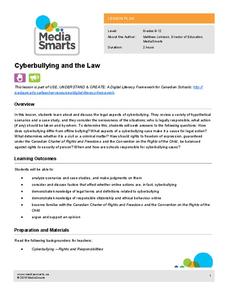Curated OER
An Introduction To Law
Students identify 4 branches of law-criminal, civil, consumer, and family. using a newspaper, they locate examples of how laws affect citizens on a daily basis.
Curated OER
Juvenile Court - The Law
An interesting activity on juvenile law, and the juvenile court system. Young law makers are given a lengthy document to read on the basics of juvenile law, then they must answer some questions about what they've read. Additionally, they...
Curated OER
Government Lesson Plan: Lesson Plan 9
Young scholars examine and compare/contrast the steps of criminal and civil cases. They define key vocabulary terms, develop an outline of a criminal and civil trial, and analyze the differences in standards of proof in legal cases.
Teaching Tolerance
Introducing 'The New Jim Crow'
When Jim Crow Laws ended, the intent behind them did not. Academics read "The New Jim Crow Laws" and an interview from the author to understand how racism has not ended, but rather changed over time. The lesson explains how prejudices in...
Constitutional Rights Foundation
Arizona v. United States — States and Immigration Law
As part of a study of immigration law, class members read a summary of the Supreme Court case, Arizona v. United States. They then examine a series of examples and acting as federal court judges, must determine if the scenarios meet the...
Curated OER
Enriching Students' Understanding of Criminal and Tort Law Using Technology
Students define criminal and tort law and explain how they are different.
Judicial Learning Center
Types of Court Cases
How can one court acquit someone of a crime, while another convicts the person of the same one? It's all because of the differences between civil and criminal trials. An informative resource provides scholars in the field of criminology...
Judicial Learning Center
The Judge and the Jury
Unless you are a lawyer, you might not understand just how unrealistic Law and Order and other legal dramas actually are. Here's a great resource to help scholars of criminology gain a more realistic perspective. The lesson outlines the...
Judicial Learning Center
Your 4th Amendment Rights
Americans love to learn about their rights, especially those that protect them from the government's power to invade their privacy. Young people are especially engaged by this topic. An informative lesson explores four Supreme Court...
Curated OER
The Juvenile Death Penalty
Sensitive material is discussed in this lesson. Please review to ensure that the content is suitable for your class. The topic is the Eighth Amendment and how the U.S. Supreme Court makes determinations about what constitutes cruel and...
Media Smarts
Cyberbullying and the Law
Research, role-playing, and reflection are the three “R’s” that form the basis of an examination of Cyberbullying. Although based on the Criminal Code of Canada, the included scenarios and case studies provide valuable resources for a...
Judicial Learning Center
The Appeal Process
Why doesn't the Supreme Court hear testimony from witnesses? How do they complete an entire proceeding in less than two hours? A helpful lesson guides scholars of criminology through these and other questions by explaining how appeals...
Judicial Learning Center
Your 1st Amendment Rights
Why should classes care about the First Amendment? An engaging lesson serves as a powerful tool for answering just that. As all four cases in the lesson relate directly to freedom of expression in schools, young scholars explore the...
Curated OER
Criminal Activities
Students investigate Justice Week in Britain. In this current events lesson, students visit selected websites related to law and order in the U.K. Students may create their own anti-social art as a culminating activity.
Curated OER
A Civil Action
Young scholars explore the roles of law enforcement officials, the news media, and civilians in crime prevention and criminal apprehension. They envision ways to build and strengthen community partnerships to address concerns about crime.
Judicial Learning Center
Levels of the Federal Courts
The Supreme Court gets all the glory, but very few federal cases make it to the highest court. An interesting lesson explores the structure of the lower levels of the federal court system. In addition to outlining the organization of...
Judicial Learning Center
State Courts vs. Federal Courts
Popular culture often portrays the Feds as the most fearsome of law enforcement agencies. Yet, someone charged with a crime is considerably more likely to end up in a state court. The lesson, one of six covering the Organization of the...
Judicial Learning Center
Your Day in Court
Whether out of choice or necessity, people want to know what will happen on a typical day in court. A helpful lesson walks scholars in the field of criminology through the trial process from opening statements to the final verdict.
Judicial Learning Center
Why Study Landmark Cases?
Why study landmark Supreme court cases? A helpful lesson offers a brief but valuable argument for the importance of these cases in the field of criminology. It introduces scholars to some key terms necessary for studying court cases and...
Judicial Learning Center
The Constitution and Rights
What's the right way to teach young historians about the Bill of Rights? Many an instructor has asked this question when pondering lesson plans over the US Constitution. The Constitution and Rights is a nifty resource that provides a...
Curated OER
Crimes from Mother Goose
Students use Nursery rhymes in a discussion of crimes and criminals in order to study how criminal law has developed and changed to maintain an organized society. They decide on the identity of criminals, the crime, and the name of the...
Judicial Learning Center
Getting Ready for Trial
A courtroom can be a scary place for the uninitiated. Get familiar with the process using a helpful overview of the activities that take place prior to both civil and criminal cases. The lesson explains the differences between civil and...
Curated OER
Social Studies: MySpace as Crime solver
Young scholars research how police use MySpace to apprehend criminals. They debate the pros and cons of this method and decide if the local policy needs to be changed. Students create a better policy for using the Internet and present it...
Curated OER
Lesson: The U.S. Westward Movement
Students research the U.S. Westward movement. In this U.S. history lesson, students research the topic, complete a creative writing activity for the lesson, and a design activity for the lesson.

























